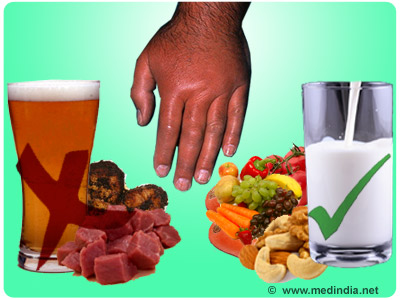- National Institute of Arthritis and Musculoskeletal and Skin Diseases (NIAMS) - (http://www.niams.nih.gov)
- Choi et al. Purine-Rich Foods, Dairy and Protein Intake, and the Risk of Gout in Men, The New England Journal of Medicine Volume 350:1093-1103, March 11, 2004.
About
Purine is a component of RNA and DNA and is also found in many foods such as liver, sardines, other flesh foods, some pulses and vegetables. It breaks down into a weak organic acid called as

Increase in uric acid levels in the blood (hyperurecemia) could be due to three major reasons:
- Increase in the production of uric acid
- Impaired elimination of uric acid by the kidneys.
- Increased consumption of purine rich foods such as red meats and their products.
Hyperuricemia by itself is not dangerous. However, if excess uric acid crystals form due to hyperuricemia, gout can develop. The crystals accumulate in the joint, causing inflammation. Blood uric acid level above 7.0 milligrams / deciliter (dL) may be indicative of gout. The amount of uric acid in the blood normally increases from 3 to 15 times as compared to normal.
There are sudden severe episodes of pain and tenderness, redness and swelling in some joints. It usually affects one joint at a time and it is often the large joint of the big toe. It can also affect other joints like the knee, ankle, foot, hand, wrist and elbow joint.
There are many risk factors cited for the appearance of hyperurecemia and gout.
- Genetics
- Gender – it is more common in males than females
- Weight - excess weight makes more tissue (purines are a component of every cell and tissue in the body) available for turnover or breakdown, which leads to excess uric acid production.
- Alcohol consumption - too much alcohol intake can lead to hyperuricemia, because alcohol interferes with the removal of uric acid from the body.
- Food habits – increased consumption of purine rich foodscan cause or aggravate gout in some people.
- Health problems such as renal insufficiency
- Certain medications can also lead to hyperuricemia.
- Uric acid buildup can result in the formation of kidney stones. This condition if untreated can damage joints and kidney. Gout has to be managed by taking proper medications and resorting to a low purine diet which would then support this health condition.








